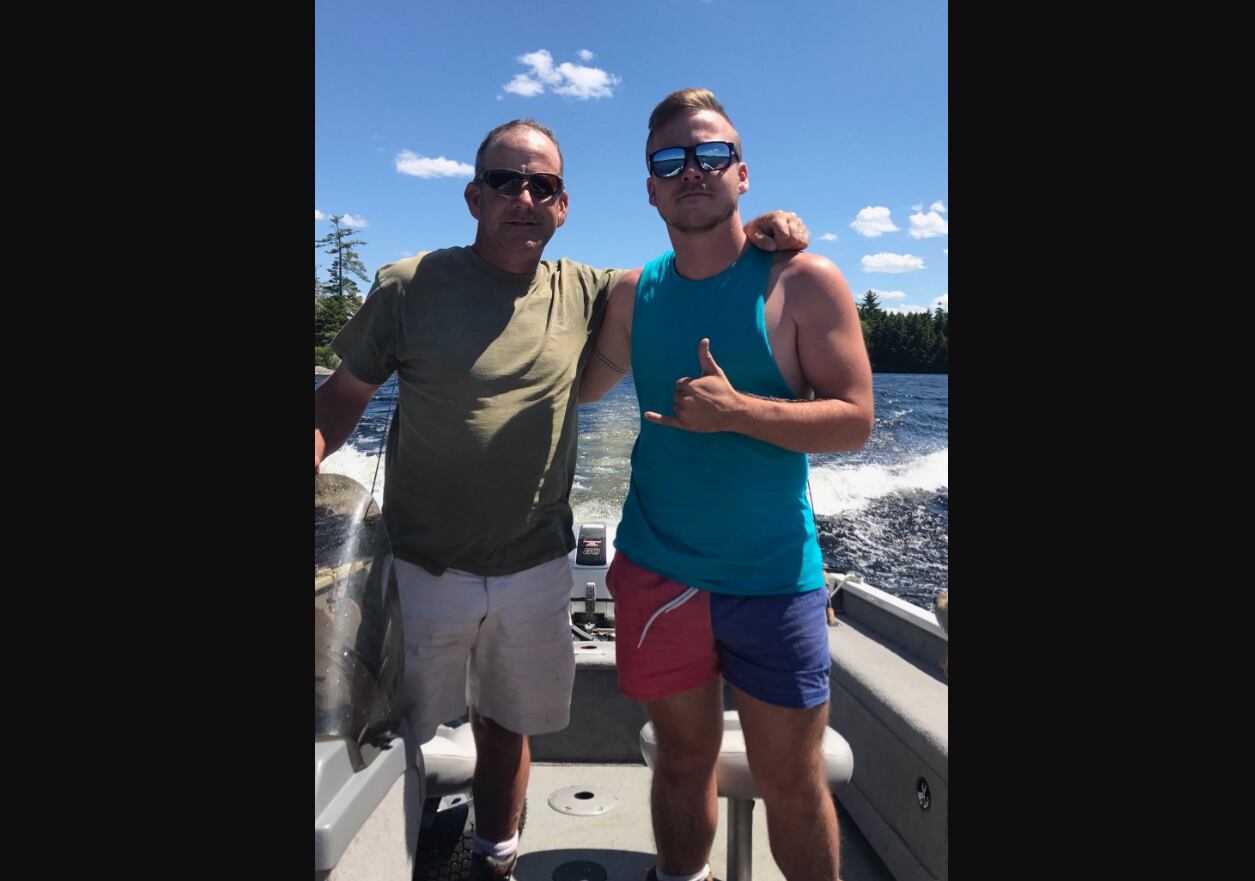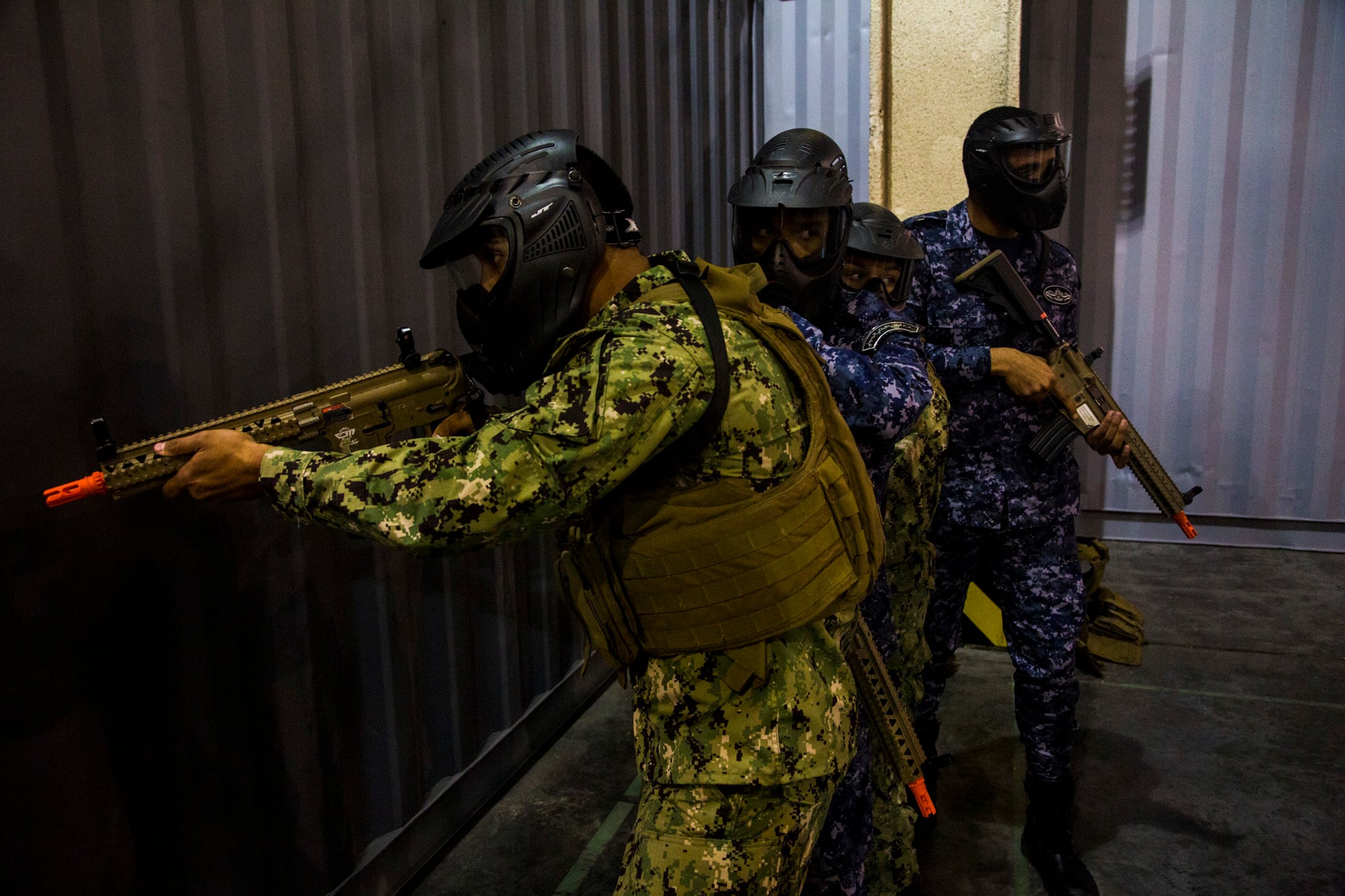Engineman 2nd Class Austin Williams had been in Bahrain for only three weeks when a Saudi driver killed him.
The 22-year-old enjoyed his work on the mine countermeasures ship Sentry and was still discovering the Persian Gulf island nation, home to the Navy’s 5th Fleet. It was far from his hometown of Freeport, Maine, but his family said he’d enlisted to see the world.
Williams had already made some friends in the barracks and was out barhopping with them on the night of April 5, 2018, according to a Naval Criminal Investigative Service report obtained by Navy Times.
As midnight neared, they opted to jaywalk across Manama’s Awal Avenue and grab a round at Wrangler, a popular bar just down the road from the base.
Williams made it to the median and stepped back into the four-lane thoroughfare, where he was struck by a Chevrolet Caprice, witnesses told NCIS investigators.
“The next thing I recall is hearing a horn, tires screeching and impact,” one of the sailors said. “I immediately ran to EN2 Williams after he hit the ground…he laid in a pool of blood."
Bahraini authorities later estimated the car, driven by a 27-year-old Saudi man, was traveling between 50 - 75 miles per hour.
The force of the impact hurled Williams 90 feet into a dirt parking lot, where he was declared dead.
Back home in Maine, military officials informed Meredith and Andrew Williams of their son’s death. They collapsed in the driveway.
Over the next eight months, they would attempt from a world away to navigate a Bahraini criminal justice system they found secretive, toothless and unjust.
They relied on updates emailed by Sana Amin, a local attorney they hired to track the criminal case against the Saudi driver.
But the Williams say there was no justice for their son.
The driver posted bail shortly after the accident and fled back to Saudi Arabia, never to return for his trial, according to Amin.
Despite his absence, a court in Bahrain convicted him of manslaughter and other charges, she said, but the sentence shocked both the petty officer’s family and Navy attorneys monitoring the case.
The Saudi man’s license to drive a vehicle in Bahrain was suspended for six months and he was fined about $1,300.
“It’s so disheartening,” Andrew Williams told Navy Times. “Nobody’s held accountable? This guy got a slap on the wrist for killing my son.”

The sentence was “quite light” but “not unusual in Bahrain,” Amin said in an email to Navy Times.
But it remains unclear if the driver ever returned to Manama to pay his penalty. Amin said she had “no information on whether the defendant entered Bahrain after the incident" and it “would not be easy to find out such info as the Prosecutors will not share it with us."
Navy officials in Bahrain referred all questions back to the government in Manama, which did not respond to multiple calls and messages from Navy Times seeking information about the case.
“This investigation is limited to providing command with the details and disposition surrounding (Williams') death,” NCIS agents wrote in their case report. “The Ministry of Interior (MOI) Traffic Directorate, Bahrain, has primary investigative jurisdiction for this fatal motor vehicle accident.”
Although the NCIS file contains Bahraini reports, the bulk of their findings was missing in a heavily-redacted copy provided to Navy Times following a Freedom of Information Act request.
The name of the Saudi driver was also blacked out. Navy Times has appealed the redactions.
A translated excerpt of a Bahraini report that escaped NCIS redaction indicated that “without paying attention or being cautious the driver of the Chevy hit the pedestrian.”
Although Williams and other sailors had been drinking before he died, a witness told NCIS that the petty officer “wasn’t drunk” and “traffic was steady but it wasn’t heavy."
The driver didn’t appear intoxicated at the scene, according to the NCIS report, and Amin said in an email to Navy Times that “the alcohol report came out negative” for both Williams and the driver.

While officials at the Navy’s 5th Fleet declined to comment in detail about the death of the sailor, the command monitored the proceedings “to ensure the family was informed and supported,” spokesman Cmdr. Joshua Frey said in an email to Navy Times.
Frey’s spare words might reflect the sensitive approach U.S. military and diplomatic officials have long taken with the Kingdom of Bahrain, a monarchy that hosts American forces in the strategically vital Persian Gulf.
The partnership has endured a brutal crackdown against the country’s Arab Spring pro-democracy movement in 2011 and widespread allegations of human rights abuses.
Saudi Arabia buttresses the government in Bahrain, too. Manama supports Riyadh’s war against Iranian-linked Houthi rebels in Yemen.
The White House also retains close relations with Riyadh — despite ongoing efforts on Capitol Hill to stop military assistance to the Saudi-led campaign in Yemen — and it remains unclear if Washington ever pressured authorities to extradite the driver.
“Why can’t the U.S. make Saudi Arabia stand for what one of their citizens has done?” Andrew Williams said. “They should be able to do something.”
Meredith Williams said Navy officials were helpful and answered all their questions, adding that attorney Amin was very responsive.
But she remains upset that her son’s wallet was never returned.
It went missing in the aftermath of the sailor’s death. His mom said Capt. Shane Cooper, a top attorney at 5th Fleet, “went through hoops” with local authorities in Manama trying to track it down.
“There was some personal effects in the wallet that belonged to Austin’s grandfather,” she said. “And we wanted it back.”

One of the Navy’s efforts to support the family included informally recommending the services of attorney Amin to them.
The Navy contracts with Amin’s firm “to provide assistance with issues of host nation criminal and civil law,” Frey said.
Shortly after the petty officer’s death, the driver posted 500 Bahraini dinars in bail—about $1,300 at today’s exchange rate—and returned to Saudi Arabia, according to an email sent by Amin to Meredith Williams.
He was supposed to return to Bahrain with his witnesses for a June 6, 2018, hearing.
“Surprisingly, the defendant who was already released on...bail by the Court back in April did not appear and nor did his witnesses!” Amin told Mrs. Williams in an email that day.
“I addressed this issue with the Court and the fact that he was released despite him not residing in Bahrain. The Judge said he was going to give them the chance (until) the 20th June and if they still fail to appear then they would take legal measures to bring them in.”
Amin said that prosecutors in Manama could’ve appealed the court’s initial decision to let the driver post bail and return to Saudi Arabia, but they didn’t.
“I am not happy about releasing him and there is no guarantee he will attend the next hearing," despite the judge sounding “certain that the defendant would attend the next hearing,” she added in her message to Williams.
Amin cited a one-page report she received from authorities indicating “that the defendant had confessed to his crime before the Court although he had denied it earlier before the Prosecution," which was a possible reason for his release from pretrial confinement.
“Worst case scenario, we will have to bring him to Bahrain through the Saudi Police,” Amin added.

That never happened.
Although the driver remained absent for the trial, the Manama court found him guilty of wrongful death/accidental manslaughter, reckless driving, endangering the lives of pedestrians and damaging property, Amin told Meredith Williams in a June 28, 2018 email.
The verdict included the sentence of six months without driving privileges in Bahrain and a $1,300 fine.
Amin told her that she would push prosecutors to appeal for stiffer penalties: “Please don’t panic,” she wrote. “We need to be patient.”
But Amin also cautioned that the defendant was still in Saudi Arabia and perhaps the most they could hope for was prodding prosecutors in Manama to issue a warrant for his arrest if he ever returned to Bahrain.
“I say this because Saudi Arabia does not extradite its citizens," Amin wrote.
On Oct. 11, 2018, she emailed Mrs. Williams that an appellate court rejected the prosecutor’s argument and upheld the original judgment.
Capt. Cooper expressed disappointment about the decision in an email he sent to Mrs. Williams. But he pledged to meet soon with Amin to explore appealing the case to a higher level.
A week later, Cooper emailed Williams to tell her that the prosecutor in Bahrain also “expressed disappointment and surprise” about the appeal court’s ruling and “agrees that this is a light punishment.”
But he also noted that in similar cases "the range of punishment can include a fine and/or imprisonment between 10 days to 3 years,” Cooper wrote.
“He has seen some past negligent vehicular manslaughter cases end with light punishments or fines but also has seen cases including imprisonment,” the captain added.
In a Nov. 4 email, Cooper theorized that the court took into account that the driver wasn’t under the influence, among other factors.
“In that case, the court opted for a light punishment,” he wrote. “Much lighter than I think should have been applied for a negligence case but it was within their allowable range of punishments.”
Cooper concluded that “we’ve exhausted our avenues within the Bahrain criminal system.”
In an email the next day, he told Mrs. Williams that he wished “there was more that I could be doing.”
“As a parent of three older teenagers, I have thought often about your family and your son and my heart breaks for you,” he added.

Although the Williams family was out of options in Bahrain’s criminal justice system, Amin pursued a civil claim against the Saudi driver and his insurance company.
Two days after Christmas, the firm offered a $60,000 settlement, Meredith Williams told Navy Times.
Amin broached the idea of pursuing further legal action against the insurer, but the family had had enough.
“She did say we could take this further and go after the insurance company, but what does that do?” Meredith Williams said. “We aren’t in this for money. We want justice and we’re not going to get it, so why keep going?”
They were left with the memories of a young sailor who had run track, loved music and wanted to make the Navy a career.
“We were glad to have it over and done with and just finished at that point,” she said. “This was my life from April 5 to Dec. 27. Our life.”
Geoff is the managing editor of Military Times, but he still loves writing stories. He covered Iraq and Afghanistan extensively and was a reporter at the Chicago Tribune. He welcomes any and all kinds of tips at geoffz@militarytimes.com.





